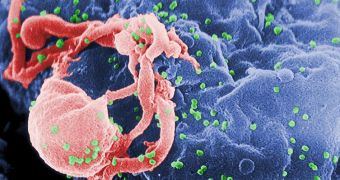A group of researchers has established that men and women who tested positive for the human immunodeficiency virus (HIV) are 96 percent less likely to infect their partners if they take antiretroviral drugs early on.
The therapy needs to begin when the immune system is still healthy, say investigators with the international research team that led the work. The US National Institutes of Health (NIH) funded the study through the National Institute of Allergy and Infectious Diseases (NIAID).
According to plans drawn out years ago, clinical trials meant to assess the efficiency at this approach in curbing HIV transmission between partners were programmed to end 4 years from now. The studies, called HPTN 052, were however terminated ahead of schedule.
An independent data and safety monitoring board (DSMB) has concluded that it's obvious the effects are there, and argued that there is no need to continue the trials given the clarity of the conclusions.
This is the first major randomized clinical trial to demonstrate this correlation. The work was conducted by the experts at the NIAID-funded HIV Prevention Trials Network. Scientists at the University of California in Los Angles (UCLA) AIDS Institute also contributed.
“The results of HPTN 052 are extraordinary news for HIV prevention efforts worldwide. Most new HIV infections worldwide tend to happen to individuals in stable relationships,” explains UCLA AIDS Institute member Dr. Karin Nielsen.
She was the co-chair of the new investigation and also holds an appointment as a professor of pediatric infectious diseases at the university's David Geffen School of Medicine
“A 96 percent reduction in the risk of HIV transmission is one of the most dramatic successes in HIV prevention reported to date,” the researcher adds.
“These findings parallel the success story of HIV mother-to-child prevention, with less than 1 percent transmission with adequate use of triple antiretrovirals in pregnancy,” Nielsen explains.
Eleven drugs were used in various combinations and dosages to conduct this trial. These chemicals are atazanavir, didanosine, efavirenz, emtricitabine / tenofovir disoproxil fumarate, lamivudine, lopinavir / ritonavir, nevirapine, ritonavir, stavudine, tenofovir disoproxil fumarate, and zidovudine / lamivudine.
“This new finding convincingly demonstrates that treating the infected individual – and doing so sooner rather than later – can have a major impact on reducing HIV transmission,” adds the director of the NIAID, Dr. Anthony S. Fauci.

 14 DAY TRIAL //
14 DAY TRIAL //